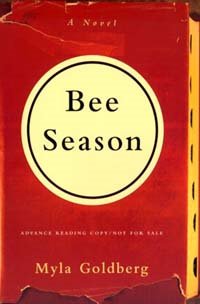 When I was a kid, I secretly fantasized about being a champion speller. Unfortunately, spelling bees are not granted the same stature and prevalence in Canada as they are in the U.S. It just ain't in our culture. Thus whatever pullulating spelling talents I may've had as a child went forever untapped. So now I spend my adult days vicariously devouring definitive ‘spelling bee’ classics such as the documentary “Spellbound” and Myla Goldberg’s debut novel “Bee Season” (I'm joking really).
When I was a kid, I secretly fantasized about being a champion speller. Unfortunately, spelling bees are not granted the same stature and prevalence in Canada as they are in the U.S. It just ain't in our culture. Thus whatever pullulating spelling talents I may've had as a child went forever untapped. So now I spend my adult days vicariously devouring definitive ‘spelling bee’ classics such as the documentary “Spellbound” and Myla Goldberg’s debut novel “Bee Season” (I'm joking really).I initially thought “Bee Season” was going to be a charming, coming of age tale about an unremarkable Jewish girl who finds her true calling as a spelling bee champion. But Eliza’s sudden, unexpected rise to spelling stardom occurs early on in the novel, and serves as a catalyst for the gradual disintegration of her close, but precariously balanced, family unit.
The author thoughtfully explores the themes of human relationships and spirituality. The spelling bee becomes a metaphor for life’s double-edged sword as each family member embarks on a self-fulfilling search for spiritual meaning… or is it really an inexplicable psychological need to fill their emotional and existential emptiness? In this way, the book was much darker than I anticipated, but it’s nevertheless a fascinating and lyrical portrayal of a contradictory and eccentric family of outsiders.
However, what I enjoyed best about the novel is its portrayal of behind-the-scenes spelling bees. In a single paragraph, Goldberg conjures up the fleeting microcosm of the national championships with elegance and humour:
" The press arrive on Friday morning. In each press kit, spellers are listed by number, their names and vital statistics printed below their photos. They come from Neptune, New Jersey; Gallup, New Mexico; and Kokomo, Indiana. They come from Fairbands, Alaska; Naples, Florida; and Rome, Georgia. Their local papers featured them in last Sunday’s human interest column. Between them they have 276 siblings, 89 dogs, 54 cats, and 108 fish. Sixty five have dreamed of accidentally attending Friday’s competition in their underwear. Forty four have churches praying for them. Twenty nine have been constipated for the past two days. Twelve are afraid of vomiting onstage. Five have been wagered upon by overconfident parents.
One will win."
Then there are the wonderful passages describing Eliza’s innate gift, from upstart speller to jedi knight, as her kinship with letters goes beyond mere rote memorization. With her father’s guidance as a Judaic scholar and his library of sacred texts, Eliza learns to decode language itself as her study and encantations of the alphabet take her deeper and deeper into the realms of cabbalistic mysticism. It’s pretty heady stuff.
I end this with one of my favourite excerpts from “Bee Season”:
"Paging through the dictionary is like looking through a microscope. Every word breaks down into parts with properties – prefix, suffix, root. Eliza gleans not only the natural laws that govern the letters but their individual behaviors. R, M, and D are strong, unbending and faithful. The sometimes silent B and G and the slippery K follow strident codes of conduct. Even the redoubtable H, which can make P sound like F and turn ROOM into RHEUM, obeys etymology. Consonants are the camels of language, proudly carrying their lingual loads.
Vowels, however, are a different species, the fish that flash and glisten in the watery depths. Vowels are elastic and inconstant, fickle and unfaithful. E can sound like I or U. –IBLE and –ABLE are impossible to discern. There is no combination the vowels haven’t tried, exhaustive and incestuous in their couplings. E will just as soon pair with A, I, or O, leading the dance or being led. Eliza prefers the vowels’ unpredictability and, of all vowels, favors Y. Y defies categorization, the only letter than can be two things at once. Before the bee, Eliza had been a consonant, slow and unsurprising. With her bee success, she has entered vowelhood. Eliza begins to look at life in alphabetical terms. School is consonantal in its unchanging schedule. God, full of possibility, is a vowel. Death: the ultimate consonant."
2 comments:
You will be psyched for the new film Akeelah and the Bee. I saw the trailer last night.
It sounds like spelling bees really let her (letter) be herself!
Seriously. Good review and a nice passage excerpt. That's some writing there.
Post a Comment